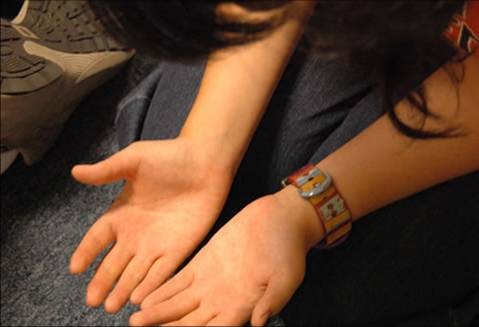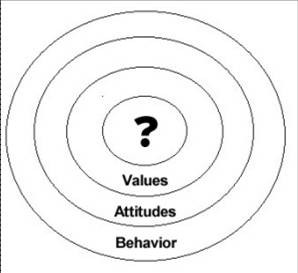 First of all I want to affirm the practice we have of inviting the Holy Spirit to come and heal people, physically, emotionally and spiritually. God wants to make us whole. Exodus 15:26 Ps 103:3 Ps 147:3 Jer 30:17 Jer 33: 6 “God’s grace – his kindness, unmerited favour and forgiving love has been lavished on us” (Eph 2: 4-9) (Wimber 1986) In the OT and NT and throughout the last 2000 years there have been numerous testimonies (stories) to the saving and healing work of God in the lives of individuals. God’s healing has been and is a reality in our lives . Given this it is also a reality that people can and have been damaged and hurt through insensitivity, ignorance and in some cases an abuse of power. A recently book published in by Ed Smith and E. James Wilder, "Keeping your ministry out of court: Avoiding unnecessary litigation while ministering to emotionally hurting people." should be a warning. Therefore we need to; Be aware: The first section of this talk is about raising awareness. Awareness that when we pray for people there is a potential for damage as well as healing. The second section includes some guidelines for good practice that incorporates being wise and being safe: We need to ask for wisdom and learn from others and use these basic principles and guidelines.
|
From a background of the experience of receiving prayer ministry regularly over seven years, I have come to some conclusions:
- Jesus sent the disciples out in power and authority. He promised the disciples power from on high – the Holy Spirit. This is God’s power to save, to heal, to serve, to live a holy life. This is a precious gift
- Power can be seen to operate in three main dimensions: Human, material and spiritual (including God). In the activity at the beginning of the session we saw examples of these three areas. Each area or domain can interact and influence the other (Wimber: Power Evangelism) Jesus demonstrated power over each of these domains in his ministry on earth. “Some people believe it to be impossible that the power of the Holy Spirit could have unholy consequences in an individuals life. But it can.” John White P128 The presence of more than one domain of power operating in any given situation, for example praying for people may account for the possibility of damage.
- Of course the existence of free will also could account for some of the potential for damage “ Human decisions have a bearing on the immediate effects of some forms of power” John White p131 Free will is a very good example of a precious gift that can have “unholy “ consequences
- And finally power can always be used wrongly: “Any of us can mishandle any gracious gift God gives us”
- The result for me was a determination
- Not to throw the Baby out with the bath water. Not to reject the grace of God (Gal 2 :21) Not to curse God and die (Job 2:9)
- Not to deny or misrepresent my experience but to use it to raise awareness
|
|
Praying for someone is not in practice just about putting your hands on someone and asking God to heal them (Although it could be argued that that's exactly what it should be)
We consciously or unconsciously bring with us our beliefs, our values, our interpretations, our culture, our experiences, our opinions. In other words we bring out theology, our practice and experience and our ethics. We bring who we are and that’s ok but we need to be aware that the person that we are praying for may not share all these views and scary as it might sound we do not have the monopoly on truth.
David’s series on “who are we and where are we going?” has been highlighting many of the areas of what we believe, what we do and how we behave. For example the Kingdom of God, the Ministry of the Holy Spirit, the Vineyard person and the Vineyard values.
|
| |
 Practices  We make specific times to receive prayer We make specific times to receive prayer
 Use a model  Lay hands on people Experiences
 Presence of God  Power encounters  Manifestations
|
|

How we behave flows out of our worldview, is shaped by our values and seasoned by our attitudes.
Worldview: Kingdom of God. See or listen to David’s talk Read Power evangelism
Values: See vineyard values on line or on the display boards
Attitudes: See bible – I Cor 13:4 Gal 5: 22 Phil 2:5 Eph 4: 32 Col3:12 Rom 15:7
|
|
 Some important concepts to consider: Some important concepts to consider:
· Our role
· The nature of boundaries
· Levels of vulnerability
Midwife
· Support in bringing something forth
· Adult to adult
Not parent to child
Not teacher to student
Not counsellors
Not trying to fix people
|
|
 Boundaries separate me from you, they allow us to separate my stuff from your stuff, my emotions form your emotions, my thoughts from your thoughts, my body from you body. They are not like walls that prevent any connection to other people. They are more like fences with gates. These gates in healthy relationships are under our control to allow good stuff to come in and stay in and bad stuff to get out and stay out. However boundaries can get reversed and/ or damaged though dysfunctional families and particularly through abuse. Boundaries separate me from you, they allow us to separate my stuff from your stuff, my emotions form your emotions, my thoughts from your thoughts, my body from you body. They are not like walls that prevent any connection to other people. They are more like fences with gates. These gates in healthy relationships are under our control to allow good stuff to come in and stay in and bad stuff to get out and stay out. However boundaries can get reversed and/ or damaged though dysfunctional families and particularly through abuse.
We do not have any rights to knock people’s boundaries down. With this in mind ……
|
|
Behold I stand at the door and knock Rev 3:20
Manifestations are not signs of God’s approval: “ Manifestations … not signs of God’s approval on one’s person or one’s theology, nor does it validate one’s assessment of a natural situation” John White
Weigh words 1 Cor 14:29
I desire truth in your inner parts Ps 51:6
|
|

Some people seem to have a greater vulnerability to experiencing damage than others. Some key features seem to be where people have had: -
- Boundaries not formed or broken
- Trust not formed or broken
- Identify and self esteem damaged and/or distorted
This can happen particularly through early experiences of separation, loss or abuse
|
|

So what practices and behaviour cause damage?
Carrying on for extended periods:
This tires people out and breaks down people boundaries, it is physically and emotionally exhausting and it is a technique used in brainwashing and cults
Encouragement to be out of control:
Being out of control does not mean God is working more powerfully. Severe emotional reactions may suggest previous trauma and people can be re-traumatised rather than experience healing.
Not referring to other people when you feel out of your depth
Some difficulties and problems are very complex and require specialist support and care. You may through ignorance or well meaning motives cause more damage. A good analogy is that of tying to put a plaster on a haemorrhaging artery. You may underestimate the severity of the situation or not be aware of warning signs for serious emotional problems that need urgent attention.
Forcing positive answers and confessions:
People loose their sense of integrity, “forcing answers and confessions”also implies an imbalance in power between person praying and the person being prayed for. It doesn't model a very helpful image of God either
Breaking confidentiality
This is so damaging to trust
Outside interpretation instead of inner interpretation
Again it implies an imbalance in power between person praying and the person being prayed for. Also can hinder people from developing their own ability to hear God and can encourage unhealthy dependence on others
Feeling you have to comply or you’re resisting God:
Again this is manipulative and promotes fear and guilt and unhelpful images of God
Judgemental attitudes:
Powerful affect on people self image, self esteem and image of God. Creates fear, guilt and isolation instead of love acceptance and healing.
Unhealthy emotional attachments
People may have damaged attachments/relationships from the past; this can be both in the person praying and the person being prayed for. These past wounds can lead to us trying to relive and resolve the past through relationships in the present. We can easily start to try to meet our past unmet emotional needs through present relationships. This experience, which psychologists would refer to as transference, counter transference and projection needs to be handled very carefully to prevent further emotional damage.
Encouraging dependence o those ministering:
Linked to above. But also inhibits our ability to mature as individuals and as Christians
|
|
Modelling negative images of God:
God is full of grace and mercy and compassion, This is what we need to model. Distorted images of God hinder our ability to come to God and to receive from God.
Abuse of power through manipulation or fear:
Gods default mode is always love and mercy. He stands at the door and knocks. People who have experienced various forms of abuse in the past are re traumatised by this sort of spiritual abuse. This further compounds and complicates their hurt and pain and God becomes the abuser in their minds.
Labelling people
“He or she always reacts like that” WE label people often to distance ourselves from them, to make us feel we understand something when often we are confused or fearful. Labelling people dehumanised them and may prevent them from moving on.
Physical contact
People you have suffered abuse, particularly physical and sexual may be very uncomfortable and react against physical contact. We have physical as well as emotional boundaries that need to be respected. Invading these boundaries leaves people feeling violated and they may relive experiences of previous abuse.
Men praying for women and VV
As above
Model of healing
Some of the “faith healing” and “prosperity gospel” models can leave a person feeling its their fault if they are not healed and do not always promote a sense of reality or integrity
Misinterpretation of manifestations of emotion:
Interpreting manifestations as demonic when their not. Early trauma can results in many reactions to prayer that do not have roots in the demonic. Screaming, extreme fear, altered personalities, muteness, falling, body contortions, trance like states and paralysis. Misdiagnosis is very likely to lead to the “wrong treatment” and is unlikely to help anyone.
Not making sure the person feels safe at the end and not following up with support
The person being prayed for has to live with this for the rest of the week. People may feel emotionally raw for some days or weeks as God heals them. This can leave people feeling vulnerable, abandoned and alone. They may not be able to carry out activities they usually do for a little while.
|
|
Effects of damage
* Feeling violated
 Conditioned emotional reactions Conditioned emotional reactions
 Guilt  Fear  Loss of identity because your trying to fit into a mould Loss of identity because your trying to fit into a mould
 Don’t learn to hear God for yourself Don’t learn to hear God for yourself
 Mental illness
|
 Loss of trust  Phobias  Withdrawal  Isolation  Distorted images of God Distorted images of God
 Altered self image Altered self image
 Disappointment, despair, depression Disappointment, despair, depression
 Loss of integrity  Low self esteem  Unable to pray for others Unable to pray for others
A couple of examples: -
When I first came to Vineyard just being in a meeting caused a great deal of anxiety. And phrases like ”Come Holy Spirit” was a good reason to vacate the room as soon as possible.
For a long time I was unable to pray fro anyone for fear of inflicting damage on them.
|
|
Don’t want us to be so “safety conscious that we can’t move. That we feel we are putting on the equivalent of masks, gloves, bio-suites when we come to praying or being prayed for!
|

Good practice
Be clear of your roleMidwife
Wimber model that David talked about at the last Gathering
Pray in 2s
Communication
Genuine, honest, non judgemental, respect, warmth, dignity, listen, empathy, use of language
Respect of boundaries
Physical, emotional, spiritual
Same sex, ask permission, opt out factor
Check progress
Refer when out of your depth
It’ s OK to acknowledge you feel out of your depth. Be honest. People to refer to include House group leaders, Pastoral team, outside agencies. Always communicate this to the person you’re praying for.
Avoid the “shock horror” reaction and acknowledge what they’ve said. Some phrases you might use: -
“Could I asked … to come and pray as well”
“ I think it would be helpful if your housegroup leader was aware of what’s going on for you at the moment, how do you feel about that?”
I think this situation would be helped by some outside support as well as us praying”
Encourage the individual to interpret what is happening using everyday language. Suggest rather than impose.
Same guidelines used when giving prophecy and words of knowledge: I think the Lord is saying…..
|
|
Make sure the person feels safe and there is follow up support where necessary
Protecting prayer, prayer of peace, sealing prayers. Practical support
Encourage honest answers about the effects of prayer
God is not honoured by us saying we’re healed when we’re not. Line in the Kevin Prosch song “Break our Hearts” asks God to “Keep our tongues from saying things that we have not seen”.
Acknowledge it’s God’s work not yours
This encourages healthy relationships and besides which it’s true!
Avoid long session and maintain privacy and dignity
Praying into the early hours of the morning! You can always plan another time and pray again. You ca shut things down and move to another room to maintain privacy and dignity.
Use a holistic approach
Don’t forget there are things you can do as well as pray: Practical support, friendship, Txt, email, phone contact an make all the difference
Maintain confidentiality
If anyone tells you about a criminal act, a situation of abuse, or about harming themselves or others you cannot keep this to yourself. The person you are praying for needs to be made aware of this you must refer to the pastoral team. Explain this and try to obtain a mutual understanding, you cannot keep these sorts of secrets. Try to obtain consent to pass this information onto one named member of the pastoral team.
|
|
What counts is not whether they fall or shake or even whether they’re healed but whether they are loved and built up
“Our job is to pray for the Kingdom of God to come, watching as we do, for what the Father is doing so we can bless it”
|